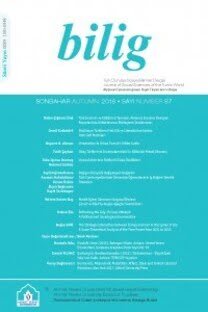Türk hikayeciliğinin protopi sayılabilecek Heft-Han'da mekan
Nev’i-zâde Atâyî’nin 17. yüzyılda kaleme aldığı Heft-hân, Türk hikâyeciliğinin oluşumu sürecinde bir prototip olarak değerlendirilebilecek özellikler taşımaktadır. Yedi ayrı hikâyenin yedi ayrı kişinin ağzından anlatıldığı mesnevide şair, kullandığı mekânları titizlikle seçmiş ve hikâye kahramanlarını psikolojilerine uygun olarak tasvir etmiştir. Bu yönüyle eserdeki mekânlar, mesnevinin serüvenine yön veren bir yapıda oluşturulmuştur. Henüz insan–mekân ilişkisinin kuram olarak bilinmediği bir devirde bu münasebetin Nev’i-zâde Atâyî tarafından şiirsel bir yapıda temellendirilmesi Türk hikâyeciliği adına önemli bir aşamadır.
___
- An, Ahmet (1996). Kıbrıs’ta İsyanlar ve Anayasal Temsiliyet Mücadelesi. Lefkoşa: Mez-Koop Yayınları
- Atatürk, Mustafa Kemal (1933). Nutuk. TC Kültür Bakanlığı resmi internet sitesi: http://www.kultur.gov.tr/TR/BelgeGoster, erişim tarihi: 06.01.2008.
- Denktaş, Rauf (2004). “ Annan Planı ve Kıbrıs”. TBBM Genel Kurulu Konuşması. 22. Dönem 2. Yasama Yılı, 74. Birleşim.
- Haslam, Alexander (1997). “Stereotyping and social influence: Foundations of stereotype consensus”. R. Spears, P.J. Oakes, N. Ellemers ve S.A. Haslam (Der.), The Social Psychology of Stereotyping and Group Life: 119-143. Oxford: Blackwell.
- Haslam, Alexander vd (998). “The group as a basis for emergent stereotype consensus”. European Review of Social Psychology, 22: 251-278.
- Hogg, Michel A. ve Dominique Abrams (1993). “Uncertainty reduction”. M.A Hogg, ve D. Abrams (Derl), Group motivation: Social psychological perspectives: 173-190. England:Harvester Wheatsheaf.
- İsmail, Sabahattin (2000). Cyprus Peace Operation. Lefkoşa: Akdeniz News Agency Publications.
- Kızılyürek, Niyazi (2005). Milliyetçilik Kıskacında Kıbrıs. İstanbul: İletişim Yayınları.
- Mavratsas, Caesar V. (1999). “National identity and consciousness in everyday life: Towards a sociology of knowledge of Greek-Cypriot nationalism”. Nations and Nationalism, 5: 91-104.
- Reicher, Stephen vd. (2006). “Saving Bulgaria’s Jews: an analysis of social identity and the mobilisation of social solidarity”. European Journal of Social Psychology 36: 49-72.
- Reicher, Stephen, S. Alexander Haslam ve Nick Hopkins (2005). “Social identity and the dynamics of leadership: Leaders and the followers as collaborative agents in the transformation of social reality”. The Leadership Quarterly, 16: 547- 568.
- Reicher, Stephen ve Nick Hopkins (2001). Self and Nation. London: Sage.
- Reicher, Stephen ve Fabio Sani (1998). “Introducing SAGA: Structural analyis of group analysis”. Group Dynamics: Theory, Research and Practice, 2 (4): 267-284.
- Sani, Fabio ve Stephen Reicher (2000). “When consensus fails: an analysis of the schism within the Italian Communist Party”. European Journal of Social Psychology, 28: 623-645.
- Somuncuoğlu, Sadi (2003). Sorularla Belgelerle Kıbrıs: Çözüm mü Çözülme mi? Ankara: Türkiye Sağlık İşçileri Sendikası Yayını
- Tajfel, Henry (1978). Differentiation between social groups: Studies in the social psychology of intergroup relations. London: Academic Press.
- Talat, Mehmet Ali (2003). “Referandum”. Basın açıklaması. 10.03.2003. http://www.ctpkibris.org/basin/1000303.htm. Erişim tarihi: 05/01/2006
- Turner, John (2005). “Explaining the nature of power: A three-process theory”. European Journal of Social Psychology, 35: 1-22.
- Turner, John vd. (1987). Rediscovering the social group. Oxford: Basil Blackwell.
- Turner, John ve Penelope J. Oakes (1997). “The socially structured mind”. C. McGarty ve S. A. Haslam (Derl), The Message of Social Psychology (s. 355-373). Cambridge: Blackwell Publishers.
- Witting, Kerstin (2005). People United in a Country Divided: Bi-Communal Activities In Cyprus. Basılmamış Master Tezi.
- ISSN: 1301-0549
- Yayın Aralığı: 4
- Başlangıç: 1996
- Yayıncı: Ahmet Yesevi Üniversitesi Mütevelli Heyet Başkanlığı
